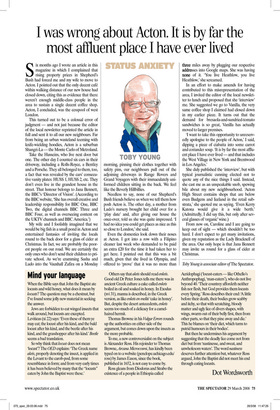Mind your language
When the Bible says that John the Baptist ate locusts and wild honey, what does it mean by locusts? The question may be a chestnut, but I’ve found some jolly new material in seeking the answer.
Jews are forbidden to eat winged insects that walk around, but locusts are excepted. Leviticus (xi 22) says: ‘Even these of them ye may eat; the locust after his kind, and the bald locust after his kind, and the beetle after his kind, and the grasshopper after his kind.’ Beetle seems a bad translation.
So why think that locust does not mean ‘locust’? The OED explains: ‘The Greek name akris, properly denoting the insect, is applied in the Levant to the carob-pod, from some resemblance in form; and from very early times it has been believed by many that the “locusts” eaten by John the Baptist were these.’ Others say that akris should read enkris. Good old Dr Peter Jones tells me there was in ancient Greek culture a cake called enkris boiled in oil and soaked in honey. In Exodus (xvi 31), manna is described, in the Greek version, as like enkris en meliti ‘cake in honey’. But, despite the desert antecedents, enkris seems too much of a delicacy for a camelhaired hermit.
Thomas Browne in his Vulgar Errors rounds up the authorities on either side of the argument, but comes down upon the insects as the more probable.
To me, a new controversialist on the subject is Alexander Ross. His rejoinder to Thomas Browne, Arcana Microcosmi, has kindly been typed on to a website (penelope.uchicago.edu/ ross) by James Eason, since the book, published in 1652, is not easy to come by.
Ross gleans from Diodorus and Strabo the existence of a people in Ethiopia called Acridophagi (‘locust-eaters — like Othello’s Anthropophagi, ‘man-eaters’), who do not live beyond 40. ‘Their countrey affordeth neither fish nor flesh, but God provides them locusts every Spring.’ Ross describes their end: A‘ little before their death, their bodies grow scabby and itchy, so that with scratching, bloody matter and ugly lice of divers shapes, with wings, swarm out of their belly first, then from other parts, so that they pine away and die.’ This he blames on ‘their diet, which turns to putrid humours in their bodies’.
But then he undermines his argument by suggesting that the deadly lice come not from diet but from ‘nastinesse, and sweat, and unwholesom waters’. The word nastiness deserves further attention but, whatever Ross argued, John the Baptist did not meet his end through eating locusts.
Dot Wordsworth
















































































 Previous page
Previous page